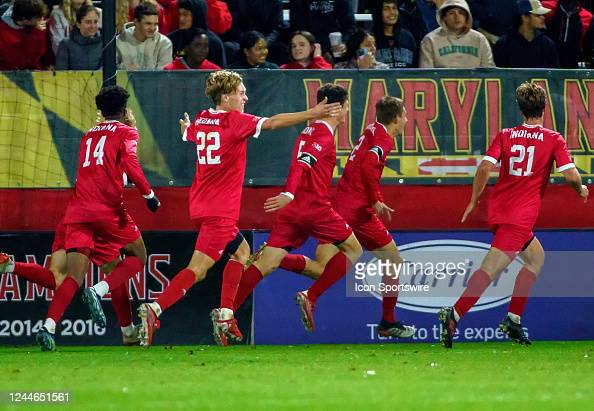The world of soccer: Why the American system is bad

More stories from Matthew Taylor

Icon Sportswire via Getty Images
COLLEGE PARK, MD – NOVEMBER 09: Indiana celebrate the game winning goal during a Big 10 soccer semi-final match between the Maryland Terrapins and the Indiana Hoosiers, on November 09, 2022, at Ludwig Field, in College Park, Maryland. (Photo by Tony Quinn/Icon Sportswire via Getty Images)
It is no secret that the United States is bad at men’s soccer. The national team has struggled in the World Cup for its entire existence, and the MLS is viewed as a retirement league. So, why is that? Well, the answer is simple: Soccer is “Americanized.”
Soccer has never been the top sport, and it never will be. There isn’t a big enough fan base in the U.S. to contest sports such as football and basketball. The American soccer league, otherwise known as Major League Soccer or MLS, understands this, and in order to grow the sport, they have to “Americanize” it. In the early 90s, when the MLS was created, many of the rules were changed to gain a larger audience; those rules have since been abolished, but the league still seemed to have a very different feel to those in other parts of the world.

Part of the reason why it doesn’t have the same feel is because of the level of play. MLS, as a whole, is not anywhere close to the playing level of any of the top leagues in Europe. This makes it more difficult for American players to get better and make the national team a powerhouse because they aren’t getting the same level of competition as the powerhouses of Europe.
The discrepancy in the competition can be tied to another flaw in the American system: no relegation. In countries such as England, the bottom three teams are moved down into the league below, which is essentially the minor leagues. This makes teams more motivated to win and stay in the top league, which causes them to buy better players and do anything to be good. The lack of this in MLS has caused it to lack the competitiveness that other leagues have.

This brings us to the biggest problem with American soccer: the college system. While other countries are putting their young talent in academies, the U.S. puts it into college soccer. This is bad because the typical age range for a college student-athlete occurs during the most important time for a player to develop, and college is not the best way to do that. Signing to a club or academy allows players to play with and against older and more mature players, which will cause them to become better overall. This is contrary to the way college is because in collegiate players train with other people that are of similar age and skill, therefore stunting their growth as a player. By the time an American graduates college, a European player has already played in multiple cup finals with teams in the first division of his respective country.
If the U.S. wants to become a soccer powerhouse in the world, there needs to be a major shift in the way soccer is viewed in this country. College soccer needs to be completely eradicated, and promotion/relegation needs to be implemented in the MLS. If these things were to happen, I believe that the U.S. would be a force to be reckoned with and potentially win the World Cup.

Matthew Taylor is going into his junior year and first year writing for the FHC Sports Report. Matthew plays soccer, golf, and skis for the school. He...


